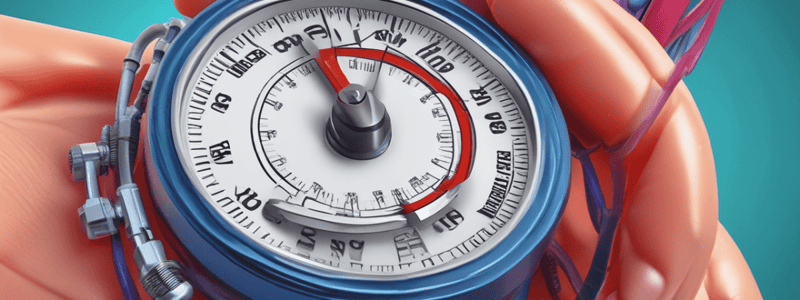Podcast
Questions and Answers
¿Qué medidas son esenciales para diagnosticar la hipertensión arterial?
¿Qué medidas son esenciales para diagnosticar la hipertensión arterial?
- Una medición de pulso
- Una medición de presión arterial
- Dos mediciones de presión arterial con minutos de diferencia (correct)
- Dos mediciones de pulso con minutos de diferencia
¿Cuál es una estrategia de tratamiento para la hipertensión arterial que no se menciona en el texto?
¿Cuál es una estrategia de tratamiento para la hipertensión arterial que no se menciona en el texto?
- Acupuntura
- Terapia de cristales
- Suplementos de vitamina D
- Cirugía bariátrica (correct)
¿Cuál de las siguientes opciones es una forma recomendada de prevenir la hipertensión arterial según el texto?
¿Cuál de las siguientes opciones es una forma recomendada de prevenir la hipertensión arterial según el texto?
- Elegir alimentos ricos en grasas saturadas
- Reducir la ingesta de sodio (correct)
- Consumir alimentos procesados
- Fumar regularmente
¿Qué tipo de ejercicios se mencionan como cruciales para controlar la hipertensión arterial?
¿Qué tipo de ejercicios se mencionan como cruciales para controlar la hipertensión arterial?
¿Qué método se menciona en el texto como una forma de manejar el estrés y, por lo tanto, mejorar la función de los vasos sanguíneos?
¿Qué método se menciona en el texto como una forma de manejar el estrés y, por lo tanto, mejorar la función de los vasos sanguíneos?
¿Qué enfoque terapéutico no se menciona como parte del tratamiento de la hipertensión arterial en el texto?
¿Qué enfoque terapéutico no se menciona como parte del tratamiento de la hipertensión arterial en el texto?
¿Qué factor genético puede predisponer a un individuo a desarrollar hipertensión arterial?
¿Qué factor genético puede predisponer a un individuo a desarrollar hipertensión arterial?
¿Qué puede causar un aumento de la presión arterial debido a la reducida resistencia vascular?
¿Qué puede causar un aumento de la presión arterial debido a la reducida resistencia vascular?
¿Cuál es el término comúnmente utilizado para referirse a la hipertensión arterial debido a la ausencia de síntomas notables?
¿Cuál es el término comúnmente utilizado para referirse a la hipertensión arterial debido a la ausencia de síntomas notables?
¿Qué factor puede provocar cambios hormonales que aumenten la frecuencia cardíaca y causen constricción de los vasos sanguíneos?
¿Qué factor puede provocar cambios hormonales que aumenten la frecuencia cardíaca y causen constricción de los vasos sanguíneos?
¿Qué efecto puede tener el exceso de sal, alcohol y grasas saturadas en la presión arterial?
¿Qué efecto puede tener el exceso de sal, alcohol y grasas saturadas en la presión arterial?
¿Cuál de las siguientes afirmaciones es verdadera sobre el dolor hipertensivo?
¿Cuál de las siguientes afirmaciones es verdadera sobre el dolor hipertensivo?
Flashcards are hidden until you start studying
Study Notes
Overview of High Blood Pressure
High blood pressure, also known as hypertension, is a common condition that affects millions of people worldwide. According to the World Health Organization (WHO), it's estimated that around 1.13 billion people globally have high blood pressure. This condition occurs when the force of blood pushing against the walls of the arteries is consistently too high.
Causes of Hypertension
Several factors contribute to the development of high blood pressure:
- Age: As individuals age, their blood vessels become stiffer, which can lead to increased blood pressure.
- Genetic Factors: Certain genes may predispose an individual to develop hypertension.
- Dietary Habits: Consuming excessive amounts of salt, alcohol, and saturated fats, along with low intake of fruits and vegetables, may increase blood pressure.
- Physical Inactivity: Lack of regular physical activity can contribute to higher blood pressure due to reduced vascular endurance.
- Obesity: Excess body weight, particularly visceral fat (fat surrounding organs), has been linked to raised blood pressure.
- Stress: Chronic stress can cause hormonal changes leading to increased heart rate and constriction of blood vessels, resulting in high blood pressure.
Symptoms of Hypertension
Often referred to as the "silent killer," hypertension typically does not present any noticeable symptoms until complications arise. However, some individuals might experience mild headaches, dizziness, and shortness of breath.
Diagnosis of Hypertension
Blood pressure measurements are essential to diagnose hypertension. Two sets of measurements are taken, each separated by a few minutes. If either measurement is above the normal range (greater than or equal to 130 mmHg systolic or greater than or equal to 80 mmHg diastolic) on both occasions, the person is considered to have hypertension.
Treatment of Hypertension
Treatment strategies involve lifestyle modifications, medication, and sometimes surgery. These approaches aim to reduce risk factors associated with elevated blood pressure while improving overall cardiovascular health:
- Lifestyle Modifications: Maintaining a healthy diet, engaging regularly in aerobic exercises, reducing sodium consumption, limiting alcohol, quitting smoking, and managing stress levels are crucial steps in controlling hypertension.
- Medications: Various drugs like ACE inhibitors, beta blockers, and calcium channel blockers are used to manage blood pressure.
- Surgery: Surgeries such as renal denervation are occasionally employed in severe cases of hypertension where medications fail to produce adequate results.
Prevention of Hypertension
Adopting certain habits can help prevent or manage high blood pressure:
- Healthy Diet: Reducing sodium intake, increasing fruit and vegetable consumption, choosing whole grains over refined products, and minimizing processed foods can improve blood pressure control.
- Exercise Regularly: Engaging in regular physical activity helps maintain optimal blood pressure levels.
- Maintain Appropriate Weight: Losing excess pounds, especially waist circumference, reduces the risk of developing high blood pressure.
- Manage Stress: Employing relaxation techniques, meditation, yoga, or other stress management methods promotes better blood vessel function.
Studying That Suits You
Use AI to generate personalized quizzes and flashcards to suit your learning preferences.



